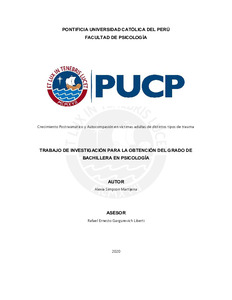| dc.contributor.advisor | Gargurevich Liberti, Rafael Ernesto | |
| dc.contributor.author | Simpson Martijena, Alexia | |
| dc.date.accessioned | 2022-01-11T16:28:30Z | |
| dc.date.available | 2022-01-11T16:28:30Z | |
| dc.date.created | 2020 | |
| dc.date.issued | 2022-01-11 | |
| dc.identifier.uri | http://hdl.handle.net/20.500.12404/21245 | |
| dc.description.abstract | El objetivo de la presente investigación fue explorar la relación entre el Crecimiento
Postraumático y la Autocompasión, así como los factores que constituyen a dichos
constructos (Neff, 2003a; Neff, 2003b; Tedeschi y Calhoun, 1995) en víctimas adultas de
distintos tipos de experiencias traumáticas. Para ello, se contó con una muestra de 138
adultos cuya edad promedio fue de 39.20 años, los cuales reportaron haber vivenciado la
muerte de ser querido (n=37), enfermedad de un ser querido (n=23), vivenciado desastres
(n=16), enfermedad propia (n=11), un accidente automovilístico (n=10), acoso (n=10),
víctima de un crimen (n=8), divorcio o separación (n=6), víctima de un acoso sexual (n=4),
entre otros (n=19). Para la medición de las variables de estudio, se aplicaron los
cuestionarios de Crecimiento Postraumático (Tedeschi y Calhoun, 1996) y la Escala de
Autocompasión en forma corta (Raes, Pommier, Neff y Van Gucht, 2011). Los resultados
de los análisis de confiabilidad determinaron que ambas escalas presentan una alta
consistencia interna en la muestra elegida. Se halló que únicamente los componentes
positivos de la Autocompasión predicen de manera significativa los cinco subdimensiones
que componen el Crecimiento Postraumático, mas no con los componentes negativos.
Asimismo, se comprobó que la edad y la Espiritualidad guardan una relación positiva y
significativa, lo cual sugiere que a mayor edad se observa un mayor crecimiento en el área
de Espiritualidad. Finalmente, los resultados muestran que los puntajes de Autocompasion
fueron significativamente más elevados que los de Autojuocio en la muestra estudiada. | es_ES |
| dc.description.abstract | The aim of this investigation was to explore the relationship between Posttraumatic Growth
and Self-Compassion, as well as the factors that constitute said constructs (Neff, 2003a;
Neff, 2003b; Tedeschi & Calhoun, 1995) in adult victims of multiple traumatic
experiences. For this, there was a sample of 138 adults whose average age was 39.20 years,
who had experienced: the death of a loved one (n=37), sickness of a loved one (n=23),
natural disasters (n=16), sickness (n=11), a car accident (n=10), harassment (n=10), a crime
(n=8), divorce or separation (n=6), sexual harassment (n=4) between others (n=19). For the
measurement of the variables, the Posttraumatic Growth Inventory (Tedeschi & Calhoun,
1996) and the Self-Compassion Short Scale (Raes, Pommier, Neff & Van Gucht, 2011)
were applied. The results of the reliability analysis determined that both scales present a
high internal consistency in the sample. Results showed that only the positive components
of Self-Compassion significantly and positively predict all five components of
Posttraumatic Growth. Furthermore, correlation analysis indicated that age and Spirituality
have a significant and positive relationship, which suggests that a greater growth may be
observed in said area when the individual is older. Finally, the results show that the Self-
Compassion scores were significantly higher than the Self-Judgment scores on this sample. | es_ES |
| dc.language.iso | spa | es_ES |
| dc.publisher | Pontificia Universidad Católica del Perú | es_ES |
| dc.rights | info:eu-repo/semantics/openAccess | es_ES |
| dc.rights.uri | http://creativecommons.org/licenses/by-sa/2.5/pe/ | * |
| dc.subject | Trauma psíquico | es_ES |
| dc.subject | Adultos--Aspectos psicológicos | es_ES |
| dc.subject | Compasión--Aspectos psicológicos | es_ES |
| dc.title | Crecimiento Postraumático y Autocompasión en víctimas adultas de distintos tipos de trauma | es_ES |
| dc.type | info:eu-repo/semantics/bachelorThesis | es_ES |
| thesis.degree.name | Bachiller en Psicología | es_ES |
| thesis.degree.level | Bachillerato | es_ES |
| thesis.degree.grantor | Pontificia Universidad Católica del Perú. Facultad de Psicología | es_ES |
| thesis.degree.discipline | Psicología | es_ES |
| renati.advisor.dni | 09338900 | |
| renati.advisor.orcid | https://orcid.org/0000-0001-6346-4134 | es_ES |
| renati.author.dni | 74163394 | |
| renati.discipline | 313016 | es_ES |
| renati.level | https://purl.org/pe-repo/renati/level#bachiller | es_ES |
| renati.type | https://purl.org/pe-repo/renati/type#trabajoDeInvestigacion | es_ES |
| dc.publisher.country | PE | es_ES |
| dc.subject.ocde | https://purl.org/pe-repo/ocde/ford#5.01.00 | es_ES |






